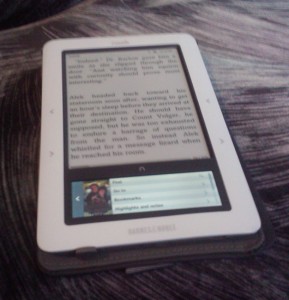Like a lot of nerds, I’m usually an early adopter when it comes to new technology–though I seem have a pretty decent eye for what technology isn’t actually going to make my life easier or better, and I do a good job of sitting those out. I had a smartphone before they were called smartphones, and a tablet pc a half-decade before Apple invented the underpowered-but-beautiful toy tablet. With e-readers I was a bit slow on the uptake, and it wasn’t because I didn’t think they were here to stay. As soon as the good quality e-ink came out, I figured out that an e-reader would make reading more comfortable for me in many ways. But I just couldn’t justify spending a bucket of money (the original Kindle’s list price was indeed measured in buckets) for a device that would enable me to do something I could do quite adequately without it.
I guess I love physical books as much as the next avid reader, but I don’t wax poetic about the smell of paper and glue. Whatevs. And in my increasingly overcrowded house, the idea of storing a thousand books or whatever on an SD card the size of my thumbnail certainly has its appeal. I like to get autographs from authors I admire, but most of my books aren’t autographed, so that’s not a reason to hold on to paper books for me.
But ebooks still cost money, you know? And, bafflingly, they’re not even really cheaper* for requiring no storage or shipping or shelf space. (Really smart people have explained to me why ebooks need to cost more than paperbacks, and I’m not smart enough to say they’re wrong. But I am honest enough to admit that I don’t get it. [But other really smart people have explained to me that paperbacks are actually underpriced, and I’m surprisingly sympathetic to this argument, so maybe it’s not that ebooks need to cost more than paperbacks, it’s that all books need to cost as much as the market will bear if we want to support the editors and authors who make wide distribution of professional quality titles possible.]) Long paragraph short, though: why should I pay a bunch of money for a device that I can use . . . to read??
So when the good e-readers came out, I made a very deliberate attempt to put a price tag on how much the features an e-reader offered were worth to me. $300? No freaking way! $100? Frankly, still no. I’ve got to admit I don’t get what motivates someone to drop that kind of money for a dedicated e-reader. For me, the line was around $40. A small enough sum that I wouldn’t miss it for long, in exchange for increased comfort and convenience.
A month or so ago I finally broke down and bought a Nook, for pretty close to my price. I got it for $50 on Craigslist, and it was one of three Nooks in my area at that price point that weekend. It’s a Nook Classic, and I don’t care one whit that there are shinier, fancier e-readers out there. A black and white screen was, as far as I was concerned, a feature and not a limitation. I wasn’t looking for an Android tablet or whatever else is pushing people up to the high-end models. I already have a computer. I already have toys. Honestly, I didn’t even care about 3G or Wifi, though I’ve got both. I’ve kept my Nook in airplane mode almost continuously since I bought it, to save battery. I download books from the library on my PC and transfer them using the cable, so the connectivity means nothing to me.

PICTURED: The conclusion to the most fun Steampunk series out there.
And you know what? I love this device. It’s like the difference between eating Asian food with crappy restaurant balsa-wood and using your own high quality chopsticks. (And if you don’t know what I mean, go out and get yourself some good wood or lacquer chopsticks post-haste!)
Since I got my Nook, my enjoyment of reading has increased substantially. I can take it easy on my eyes with a bigger typeface. I can find a well-lit spot and not have to shift every time I switch from a left-page to a right-page. It sounds like such a small thing, but as with smooth, splinter-less chopsticks, it makes a huge difference in my comfort, and this means I can keep reading longer. I’ve read more in the last month than in the two or three months before. (And it’s not like I was ever a reluctant reader.)
I wonder if these benefits would be meaningful to younger readers, or if it’s just aging fogeys like me with fading eyes who are likely to care. If you’re a reluctant reader, physical discomfort might not be a major factor in your reluctance, but who’s to say it’s not a factor at all? For all the stats being thrown about about how ebooks are outselling hardcovers and about how Americans are actually reading more these days (believe it or not), I haven’t really seen an analysis of whether or not one phenomenon is having an impact on the other. Are e-readers creating new readers? I have to think it’s at least a possibility. Or at least it will become one as prices continue to tumble.
Stay tuned for part 2, whenever I get around to writing it:
e-readers: saving literacy or cutting out the have-nots?
* Obviously I’m referring to books from major royalty-paying presses.

 Subscribe via RSS
Subscribe via RSS
One Response to The case of the semi-reluctant e-reader